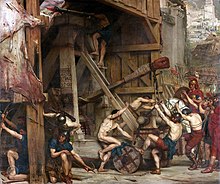Carthaginian peace
Appearance
English
[edit]
Etymology
[edit]In reference to the draconian peace terms imposed on the Carthaginian Empire by the Roman Republic following the Punic Wars. At the end of the Third Punic War, Rome destroyed Carthage.
Noun
[edit]Carthaginian peace (usually uncountable, plural Carthaginian peaces)
- (politics) Peace maintained with devastating consequences for one of the parties involved; a very harsh peace, particularly one that results in the defeated side being destroyed or nearly so.
- 2015, Stephen Gross, Export Empire[1], Cambridge: Cambridge University Press, →ISBN, pages 50–51:
- To be sure, the Treaty of Versailles was not a Carthaginian peace as many contemporaries, most notably John Maynard Keynes, believed. Germany was not crippled as an economic power. It remained the most populous state in Europe, its industrial potential was largely intact, and with the demise of the Habsburg, Ottoman, and Russian empires Eastern Europe was now populated by small, fragile states. While on the surface reparations seemed to impose a huge burden on Germany’s public finances, Weimar’s inflation and the speculation that came with it led to a substantial net flow of capital into Germany.
Translations
[edit]Translations
|

